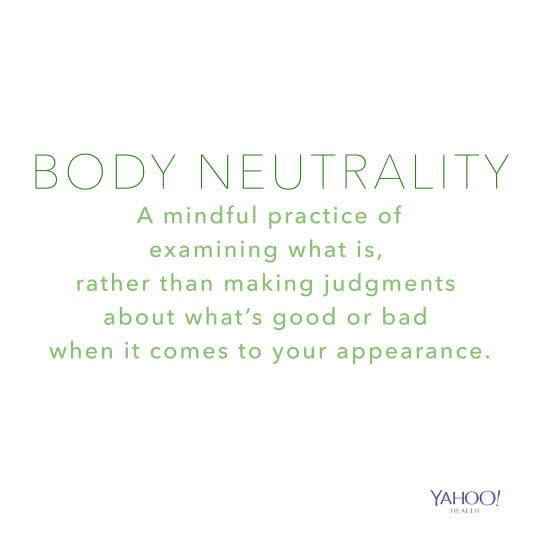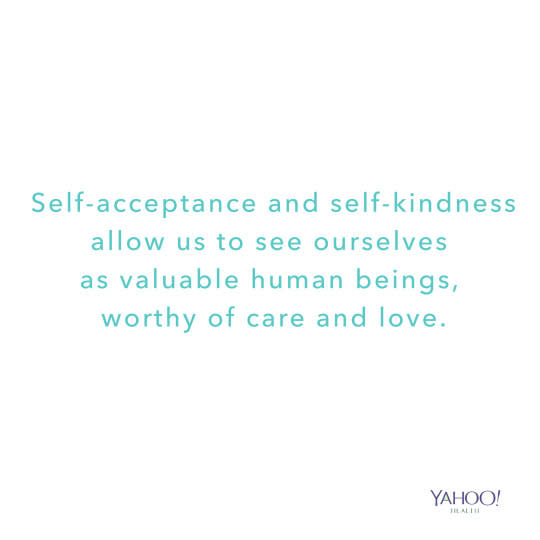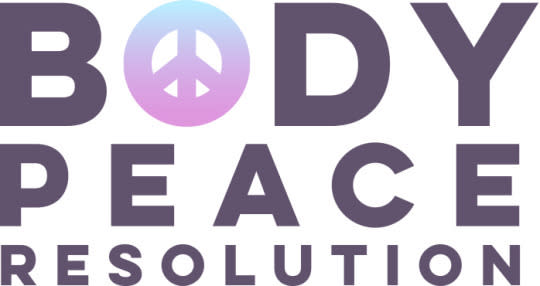Why You Don’t Have to Love Your Body

There’s a midway point between body loathing and body loving — and it may be the healthiest, most attainable mindset of all. (Photo: Getty Images)
Maybe you start hating the way your thighs rub together when you walk after buying a new pair of slim-cut jeans. Or perhaps you lament your breakout-prone skin as you’re putting on makeup for a night out.
Even though “love your body” messages have been drilled into us, there’s still a tendency to body bash. And if you’re used to putting down certain aspects of your appearance, it can be difficult — if not impossible — to do a 180 and start celebrating your bod just because you’re told you should. So rather than shooting for a body-love mindset, a more realistic aim might be “body neutrality.”
Never heard of this term? Here’s the low-down: “Instead of assessing yourself as too fat or too thin, you think of yourself in a neutral space,” says L.A.-based psychologist Kim Chronister, PsyD, author of FitMentality. “Body neutrality is a mindful practice of examining what is, rather than making judgments about what’s good or bad when it comes to your appearance.”

“Your body is not a work of art that you can paint and mold to make it more pleasing to you,” adds Jane Shure, PhD, co-founder of the Resilience Group. “It is an organic form that is the vessel for your internal organs. Body neutrality is about appreciating how your body functions and what it does for you.” It allows you to walk across the street to buy a cup of coffee, to go for a swim in the ocean, to haul groceries up to your apartment … the list goes on and on.
According to an original Yahoo Health survey, 42 percent of Americans already have a body-neutral perspective, where they have made peace with their looks — proverbial warts and all. But it’s harder for women to achieve this perspective than men: The survey showed that 36 percent of females are ambivalent (meaning they feel simultaneously positive and negative toward their bodies), and 18 percent have negative associations with their bodies. Only 36 percent are body-neutral, and just 11 percent experience body positivity — compared to 49 percent of men who are body-neutral, and 20 percent who have a positive self-image.
Related: The Shocking Results of Yahoo Health’s Body-Positivity Survey
But it’s definitely worth working on, because the benefits of improving your body image are huge: 88 percent of “body positive” people and more than two-thirds of “body neutral” people agree that their frame of mind has led to higher levels of happiness and confidence.
“Many people don’t realize that the way we talk to ourselves about our bodies has a long-term ripple effect,” Shure tells Yahoo Health. “When you have an attitude of contempt and criticism toward your appearance, your body releases adrenaline and cortisol, which trigger the fight-or-flight response and make us anxious, irritable, shameful, and self-doubting. This has a multitude of effects — for example, it corrodes your confidence, so that you take fewer risks both socially and professionally.” On the flip side, when you feel at ease about your looks, your system sends out calming, restorative oxytocin that helps you function at your peak in every realm.
In addition, the way you feel about your body has an enormous impact on how you feel about yourself overall. “A negative body image promotes an attitude of seeing yourself as a problem to be fixed, and as a result you tend to talk to yourself in a demeaning way,” Shure says. “If you become overly focused on what you need to do to improve or change yourself, then you’re inhibiting your productive life energy. In the workplace, you’re more likely to hold back from asking for what you want; in relationships, you’re more likely to be reticent and inhibit your voice. On a spirit level, you’re way more likely to develop depression rather than joy or satisfaction. Self-acceptance and self-kindness allow us to see ourselves as valuable human beings, worthy of care and love.”

Unfortunately, reaching a positive outlook isn’t as simple as giving yourself the occasional pep talk. Although teen and millennial females believe that being healthy is more than just a number on a scale and that people should honor their bodies no matter what their size, they also have the highest rates of body ambivalence and negativity as compared to men of all ages and older women.
So while in an ideal world we’d all love our lumps and bumps, finding a place of acceptance with our looks is a more attainable goal — at least a giant leap forward to body positivity. Here, we break down how to score body neutrality.
Get your yoga fix
Whether it’s a vinyasa class or weight training or practicing progressive muscle relaxation, any physical mindfulness activity can help you get to neutrality. “Focusing on reducing tension in your muscles during a relaxation exercise, or lifting up a weight during a biceps curl, or paying attention to the position of your arm in a yoga pose forges connections between your body and your mind that are nonjudgmental,” Chronister says. “It emphasizes what your body can do, rather than how it looks.”
Related: How I Became Confident
Talk the talk
Research shows that affirmations are a powerful way to shift your viewpoint. “At least once a day, repeat a neutral self-affirmation,” Chronister tells Yahoo Health. She suggests repeating phrases to yourself such as My mind and body are one, I’m grateful for my body, and My body is in great health.
Aim to do this daily for a couple of months, and then you can go down to a few times a week. “Self talk is a product of the unconscious, and it takes at least two months to create a new habit,” Chronister says. Over time, this compassionate line of thought will become your new norm.
And if you do catch yourself body shaming, try this trick to snap out of it: “Imagine pressing the mute button on a remote control,” Shure says. “We have to become aware of our inner critic that makes us feel inadequate, and then be conscious about interrupting that train of thought.”
Treat yourself to a rubdown
Here’s something to celebrate: Indulging in spa treatments can lead to body neutrality. The theory is that if your underlying concern is being judged based on how you look, then revealing your body to an impartial massage therapist, who’s used to seeing all different body types and isn’t going to raise her eyebrows at a little cellulite, can help you get over it. “This is a psychological technique called exposure and response prevention,” Chronister says. “It works with any phobia: The more you expose yourself to your fear, the less intense your anxiety becomes over time.”
Swivel the spotlight
Do you find yourself stressing about what people think of your looks when you’re out and about? One thing that can help you stay in the neutral zone is to keep in mind the spotlight effect, a psychological phenomenon where you believe that others are taking greater note of your appearance than they in fact are. The truth is, most people are too concerned with how they themselves come across to spend time assessing you.
If you’re caught up in a cycle of worrying about what others are thinking, try bringing to mind the person who is warmest and kindest in your life. Whether it’s your grandma or your sister, she wouldn’t focus on your bad hair day. “Internalize what she believes: that your body is a vessel for carrying the good heart of the person she loves,” Chronister says. Now that’s what really matters.
Body-Peace Resolution is Yahoo Health’s January initiative to motivate you to pursue wellness goals that are not vanity-driven, but that strive for more meaningful outcomes. We’re talking strength, mental fitness, self-acceptance — true and total body peace. Our big hope: This month of resolutions will inspire a body-peace revolution. Want to join us? Start by sharing your own body-positive moments on social media using the hashtag #bodypeaceresolution.

Read This Next: It’s Time to Give Your New Year’s Wishes a Makeover
